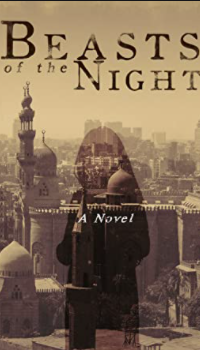A powerful force for change
Topics
Featured
Share online


Human trafficking is the stuff nightmares are made of — and it’s long been Matejs Kalns’ dream to help awaken the world to its horrors.
The slavery you learned about in history class never died, Kalns says. It evolved into many forms, like the harrowing tale the Master of Arts in Human Security and Peacebuilding grad writes about in his debut novel, Beasts of the Night.
The story isn’t true but is based on his experiences with the United Nations. He says he wrote the book to shine a light on some of the darkest of human atrocities.
The globe-trotting thriller is a fictional story of eight-year-old Mei, a Cambodian girl entangled in a child sex-trafficking ring, and Quinton Mills, the humanitarian worker who tries to save her. Frustrated with the bureaucratic institutions charged with protecting children like Mei, Mills embarks on a journey from Bangkok’s notorious red-light district to Egypt’s bustling capital.
Treading water
“Quinn is this combination of all the frustrations of all these different people I’ve met over the years,” says Kalns, who interned with the United Nations Office on Drugs and Crime in Cairo as part of his degree. That opportunity led him to Bangkok where he landed a position working on anti-trafficking with the United Nations Development Program.
“He encapsulates this idea of the whole network of humanitarian workers who have had enough. What would happen if they just took matters into their own hands?” he says.
Kalns recalls an anti-trafficking conference in Bangkok that moved painfully slow.
“There were so many different players and actors, and everyone spoke different languages. We had to have translators, and by the time we get to the first break we’re already a quarter of the way through the day,” he says. “It’s only a three-day conference and literally nothing has been achieved. We’ve only just said ‘hello.’”
Kalns couldn’t help but think of the young girls being slipped back and forth across borders as he and the other participants just sat there, greeting each other.
“Sometimes it just feels like you’re just treading water on the Titanic with this little pail of water trying to somehow bail yourself out. It feels hopeless,” he says.
‘We can’t change the past. But we can change the present.’
But the weight of injustice — both past and present — keeps him going.
A second generation Canadian, Kalns’ grandparents fled Latvia after Soviet occupation during the Second World War, landing in Canada with little more than two dollars and a pack of cigarettes.
“The Soviet army came and literally just raped and plundered and burned their way through the Baltic States and through Eastern Europe, and then occupied those lands effectively for the rest of the century,” he says.
Raised primarily by his grandmother, her story became part of his.
“Knowing what they went through — I think that’s where the sense of justice comes from,” he says. “I would have liked to have done something, but that was history.”
While he had no power over the past, Kalns was drawn to respond to contemporary crises and to Royal Roads.
The Human Security and Peacebuilding is a two-year, interdisciplinary program which allows students to choose one of three completion options including an internship.
After graduating with a Master of Arts in History from the University of Ottawa in the thick of the 2008 global recession, Kalns says he had little experience and no job opportunities. He liked how the Human Security and Peacebuilding program gave him the chance to get the experience he needed.
“You only get experience by getting a job and no one wants to give you a job until you prove you have experience. It’s this circular trap where you can’t get going,” he says.
Story: a powerful force for change
Kalns, who now works with the Government of Canada, says that his first internship in Egypt and the book it inspired wouldn’t have happened if it hadn’t been for Royal Roads.
“Here I am publishing a fictional story that takes place in the real world about human trafficking… it wouldn't have happened if I didn't meet the people I did and didn't learn what I learned.
“I've been successful and Royal Roads helped me to do that,” he says.
Human Security and Peacebuilding Program Head Prof. Kenneth Christie says human trafficking continues to go on at all levels — from the child sex-trafficking rings Kalns writes about to the highest levels of wealthy financiers like Jeffrey Epstein, the US millionaire and convicted sex offender.
“He’s incorporated those human security issues into literature — that’s very creative,” Christie says. “Literature is one of the most powerful forces for change — it makes people aware that we have a scourge of human trafficking going on, that there are millions of people out there struggling in different circumstances.”
Kalns says he hopes readers are entertained by the novel, but also inspired to act — whether that means educating themselves, talking to others about human trafficking or supporting charitable organizations working to stop it.
“Once you learn about these things, I don’t know how you can just ignore them,” he says. “You can’t expect you’re going to change the world, but you’ve got to contribute something.”